CES 2016: Netflix extends its service to almost all the world
- Published
Netflix chief Reed Hastings discusses its future with BBC Click's Spencer Kelly
Netflix has gone live in nearly every country in the world.
The firm announced it had switched on its service in 130 additional countries.
It said it was still trying to expand to China. The other exceptions are North Korea, Syria and Crimea, where it is banned from operating by US law.
The announcement was made by the firm's chief executive Reed Hastings at his keynote speech at the CES tech show in Las Vegas.
He also confirmed that Netflix would begin offering HDR (high dynamic range) content later this year.
The company's shares closed the day more than 9% higher.
"We were expecting Netflix to go everywhere, but this has happened more quickly than we thought," commented Fernando Elizalde from the tech consultancy Gartner.
"Until now, the firm had been doing it in phased stages because of the costs of marketing and dubbing or subtitling the content.
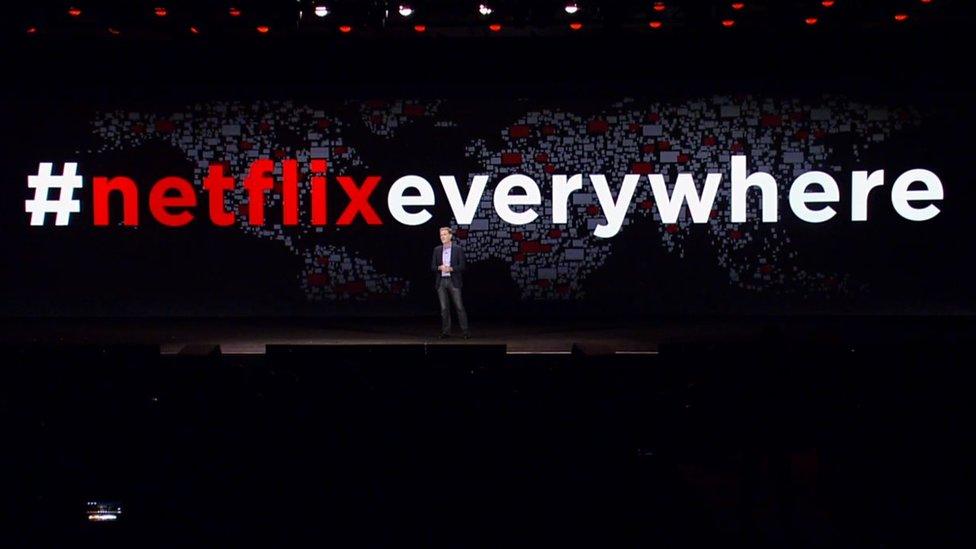
Mr Hastings said his service had kicked off the "binge era" of TV consumption
"But it's worth remembering that in some of the emerging economies it will only be people in urban areas that will be able to use it because of limited internet availability."
More languages
Mr Hastings said Netflix was in talks with the Chinese government, but acknowledged it would take time to reach an agreement.
"It's a very large country, you know a billion Chinese that we want to give access to the Netflix content," he said.
"In China you need specific permission from the government to operate, so we are continuing to work on that and we are very patient."
But one company watcher had doubts.
"China is going to be a tough nut to crack given that that three strong domestic services already exist," said Mike Goodman from Strategy Analytics.
As part of its expansion, Netflix has added support for Korean, Chinese and Arabic to its list of supported languages.
That brings the total number - in which the firm provides subtitles, captions and alternative audio - to 21 languages.
Mr Hastings added that Netflix would initially focus on expanding the reach of its existing content rather than commissioning extra locally-made shows.
HDR shows
For consumers who already have Netflix, the biggest change may be the addition of HDR.
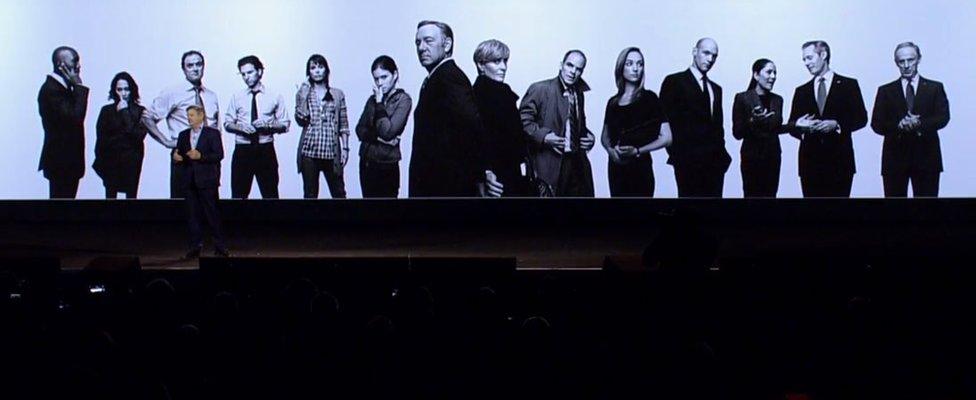
House of Cards has been a big hit for the streaming service
High dynamic range video allows compatible TVs to show millions more colours and a wider dynamic range - added shades of brightness in between black and white - letting more detail be shown.
Many experts believe the impact is greater than that of just jumping from 1080p to 4K ultra-high definition resolution alone. One consequence of using the format, however, is that it requires more data, and few TVs support it yet.
Mr Hastings said users with compatible TVs should get a "visceral sensation that's pretty amazing".
The firm's rival, Amazon, began streaming a limited number of shows in the format in 2015.
Audience members at the Las Vegas event were also given a first look at some of the service's forthcoming shows, including:
The Crown - a biopic of Queen Elizabeth II starring Claire Foy and Matt Smith
The Get Down - a musical drama about New York's disco scene in the 1970s, created by Moulin Rouge' director Baz Luhrmann
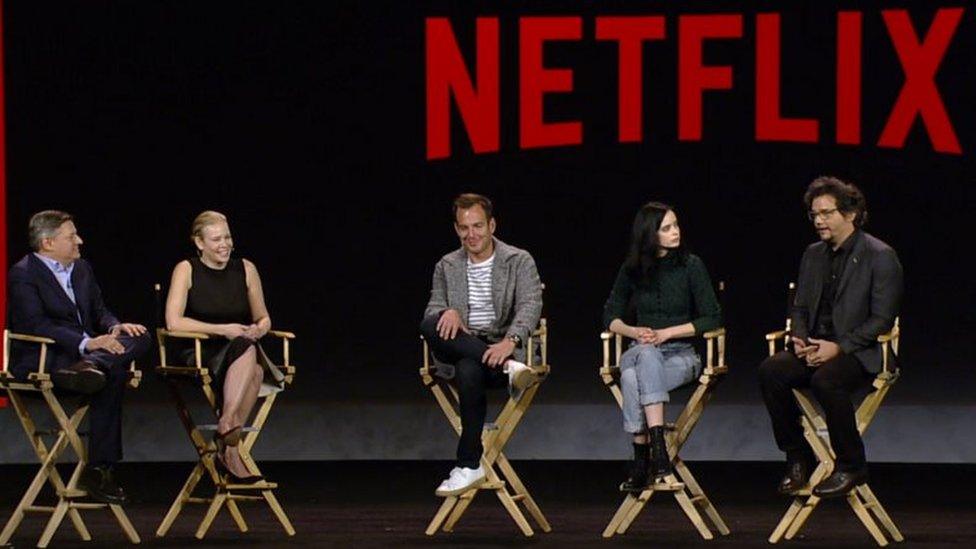
Several of the stars of Netflix's own shows appeared on stage at the CES event
Ironically, the clips were blocked for those watching a live stream of the event.
The firm also teased Chelsea Does..., a documentary series presented by the comedian Chelsea Handler that will cover topics including drugs, racism, marriage and Silicon Valley.
In addition, it announced Ricky Gervais was directing and starring in a film called Special Correspondents about a journalist who broadcasts fake war reports, which will be added to its library in April.
Mr Hastings also revealed some fresh statistics about the service.
He said it now served a total of 125 million hours a day of entertainment to its viewers, and had streamed 12 billion hours-worth of video over the final three months of 2015, which is nearly 50% up on the same period in 2014.
Read more of our CES articles and follow the BBC team covering the show on Twitter, external.
- Published7 January 2016
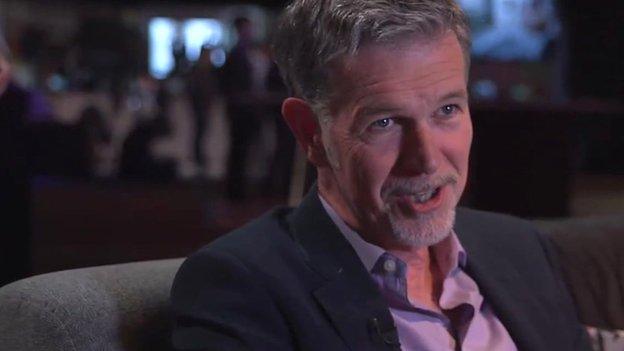
- Published7 January 2016
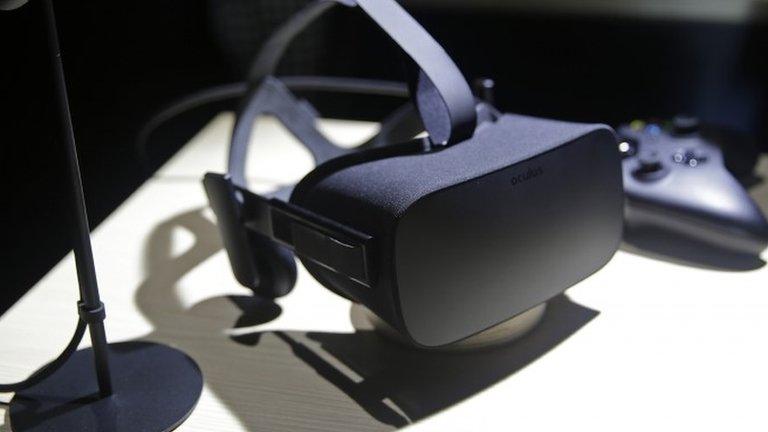
- Published6 January 2016

- Published20 January 2016